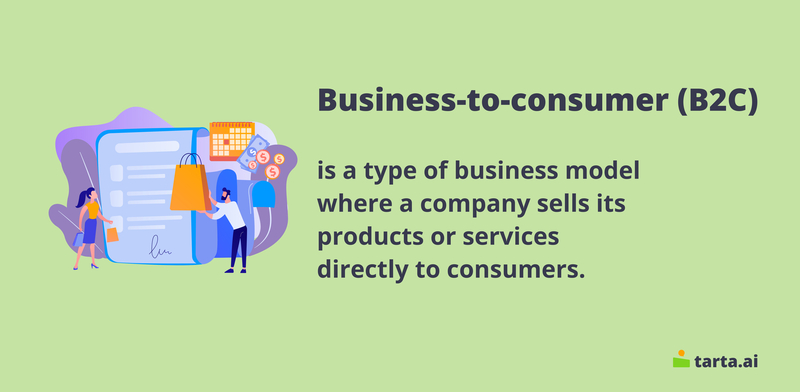Exploring the World of Business-to-Consumer (B2C)

In other words, B2C refers to the process of selling goods and services from a business to an individual consumer rather than to another business. B2C transactions typically involve smaller quantities of goods or services and are aimed at a wider range of consumers than B2B transactions.
The use of social media platforms, such as Instagram and Facebook, has become an integral part of B2C marketing strategies, as they allow companies to reach a large audience and engage with consumers directly.
The use of social media platforms, such as Instagram and Facebook, has become an integral part of B2C marketing strategies, as they allow companies to reach a large audience and engage with consumers directly.
What Is Business-to-Consumer (B2C)?
B2C is a business model that involves a company selling its products or services directly to individual consumers. The consumer is the end-user of the product or service and does not resell it. The B2C model is the most common type of business model, and it encompasses a wide range of industries, including retail, hospitality, travel, entertainment, and many more.
Millennial shoppers are digital buyers, with most consumers from this generation (86%) making purchases online, and 67% preferring to shop online rather than in-store, according to Invesp.
How Does B2C Work?
B2C businesses use a variety of channels to reach consumers, including online marketplaces, brick-and-mortar stores, and social media platforms. In recent years, e-commerce has become a dominant channel for B2C sales, with many companies setting up online stores or partnering with third-party marketplaces such as Amazon or Etsy.
B2C transactions often involve a shorter sales cycle compared to B2B transactions since there are fewer decision-makers involved in the buying process. However, B2C sales typically require a higher volume of transactions to generate the same revenue as B2B sales.
Chinese platform Taobao is the biggest online marketplace, with a GMV of $711 billion in 2021 (Statista, 2022). In comparison, Tmall and Amazon ranked second and third with $672 billion and $390 billion.
Examples of B2C Companies
There are many examples of B2C companies across a wide range of industries. Here are a few:
- Amazon: One of the largest B2C e-commerce companies in the world, Amazon sells a vast range of products directly to individual consumers.
- Apple: A technology company that sells its products directly to consumers through its brick-and-mortar stores, online store, and mobile app.
- Nike: A sportswear company that sells its products directly to consumers through its online store and brick-and-mortar retail locations.
- Marriott: A hotel company that sells its services directly to individual consumers through its website, mobile app, and customer service center.
- Netflix: A media streaming company that sells subscriptions to individual consumers for access to its library of movies and TV shows.
Conclusion
B2C is a common business model that involves a company selling its products or services directly to individual consumers. B2C transactions often involve shorter sales cycles and higher transaction volumes than B2B transactions. Companies can use a variety of channels to reach consumers, including online marketplaces, brick-and-mortar stores, and social media platforms. With the rise of e-commerce, B2C businesses have become more accessible and convenient for consumers, and the industry continues to evolve with new technologies and innovations.
- Business-to-consumer (B2C) refers to the transaction between a business and individual consumers who purchase goods or services for personal use.
- B2C transactions can occur in various ways, including through e-commerce websites, brick-and-mortar stores, and mobile applications.
- The B2C model often involves large volumes of transactions, with businesses striving to appeal to consumer preferences through personalized marketing strategies.
- Some examples of successful B2C companies include Amazon, Nike, and Apple, which have leveraged technology and effective marketing strategies to capture significant market share.
- The growth of e-commerce and digital marketing has revolutionized the B2C landscape, providing businesses with new opportunities to reach and engage with customers through social media, email marketing, and other digital channels.
- To succeed in the B2C space, companies must prioritize customer experience, offering convenient and efficient purchasing options, personalized recommendations, and top-notch customer service.
- Data analytics and consumer insights are essential tools for understanding consumer behavior and identifying opportunities for growth and improvement.
FAQ
What is Business-to-Consumer (B2C)?
Business-to-Consumer (B2C) is a type of business model where companies sell products or services directly to individual consumers rather than to other businesses.
What are some examples of B2C companies?
Some examples of B2C companies include retail stores, online marketplaces, e-commerce websites, restaurants, and entertainment companies.
What are some common strategies used in B2C marketing?
Some common strategies used in B2C marketing include social media marketing, email marketing, influencer marketing, and targeted advertising.
What are some challenges that B2C companies face?
B2C companies may face challenges such as intense competition, changing consumer preferences and behaviors, and the need to constantly adapt to new technologies and market trends.
How do B2C companies measure success?
B2C companies may measure success through metrics such as sales revenue, customer acquisition and retention rates, customer satisfaction, and brand awareness.